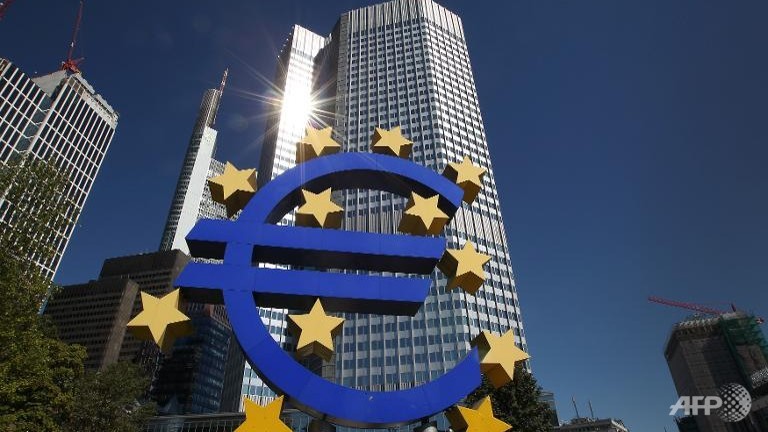EU trims 2014 eurozone growth forecast

The Euro logo pictured in front of the European Central Bank (ECB) building in Frankfurt am Main, central Germany.
(AFP/Daniel Roland)
BRUSSELS: The European Union cut its 2014 growth forecast for the eurozone on Tuesday, warning that emerging market demand may not be as strong as hoped and signalling more misery for millions out of work.
The European Commission said growth across the 17-member single currency area would amount to 1.1 percent next year, down from the 1.2 percent it forecast in May.
But growth should then rise to 1.7 percent in 2015.
The eurozone economy will shrink by 0.4 percent this year, unchanged from the previous estimate.
The figures compare poorly with the sterling neighbour Britain, tipped to grow at 1.3 percent this year followed by 2.2 percent in 2014 and 2.4 percent in 2015.
The US economy, meanwhile, will expand 1.6 percent in 2013, rising to 2.6 percent and 3.1 percent in the next two years.
Brussels warned that eurozone unemployment would be stubbornly higher than first thought next year -- at 12.2 percent rather than 12.1 percent -- and potentially going through the 20-million mark.
"The fiscal consolidation and structural reforms undertaken in Europe have created the basis for recovery," EU Economic Affairs Commissioner Olli Rehn said, speaking of a "turning-point" for the global economy.
At the same time, it is "too early to declare victory", he said.
The commission is primarily worried about fiscal policy "uncertainty" in the United States as debt mounts, coupled with mounting "vulnerabilities" in emerging markets.
The commission said the commodities and investment-driven models behind the Russian and Chinese economies, for instance, may now need change, with the emphasis to be put on domestic rather than export demand.
Trade imbalances within the eurozone are already causing concern, with mounting calls for Germany's export dynamo to be toned down in favour of promoting domestic demand and so help drive the greater good of eurozone integration.
The commission pegged Germany's current account surplus at 7.0 percent of gross domestic product (GDP) this year, easing only slightly to 6.6 percent next year and 6.4 percent in 2015.
Eurozone governments have agreed a preferred target of 6.0 percent, with EU leaders pressuring Berlin to allow greater room for wage growth and boost investment in infrastructure to stimulate domestic demand and competition internally.
Under new economic governance rules to correct such imbalances, negative or positive within all countries and even the biggest, "there could be a notification," Rehn said of what he termed a "political" issue still to be discussed in depth.
France, Spain could miss targets
As well as unemployment, the modest recovery poses other problems, especially for member state public finances as tax revenues remain under pressure.
France and Spain especially could again miss agreed EU public deficit targets out to 2016.
In both cases, marking out likely political battles ahead, Rehn told a press conference that the need for economic reforms is "of particular urgency".
The commission's forecasts put the French public deficit -- the shortfall between spending and revenue -- at 4.1 percent this year, 3.8 percent next and still posting a 2015 shortfall at 3.7 percent.
With the French economy struggling, President Francois Hollande faces growing pressure from Brussels to meet the EU's 3.0-percent-of-GDP ceiling.
The risk otherwise is that Paris could face fines or intervention by Brussels under new rules on economic policy coordination to make sure France's national budget returns the country within the EU norms.
The Spanish public finances are even more perilously wide of the mark.
As Madrid strives to emerge from a burst property-and-banking bubble, nine quarters in a row of recession and soaring joblessness, it was given until 2016 to reach the 3.0-percent mark after a eurozone bailout for its banks.
However, despite all the pain and austerity imposed, Spain's public deficit will hit 5.9 percent next year and worse still, rise again to 6.6 percent in 2015.
Twice-bailed out Greece is finally set to emerge from six years of recession next year even though it still faces tough talks with the creditors Troika of the EU, European Central Bank and International Monetary Fund on managing its economy and meeting rescue commitments.
Slovenia and Cyprus are expected to remain in recession next year -- the former "not necessarily" heading for a bailout, Rehn said, but only "on condition" it concludes deep reforms including a radical overhaul of its banks.
What the stars mean:
★ Poor ★ ★ Promising ★★★ Good ★★★★ Very good ★★★★★ Exceptional
Latest News
More News
- Cashless payments hit 28 times GDP in 2025 (February 04, 2026 | 18:09)
- SSIAM and DBJ launch Japan Vietnam Capital Fund (February 04, 2026 | 15:57)
- Banks target stronger profits, credit growth in 2026 (February 04, 2026 | 15:43)
- Vietnam on path to investment-grade rating (February 03, 2026 | 13:07)
- Consumer finance sector posts sharp profit growth (February 03, 2026 | 13:05)
- Insurance market building the next chapter of protection (February 02, 2026 | 11:16)
- NAB Innovation Centre underscores Vietnam’s appeal for tech investment (January 30, 2026 | 11:16)
- Vietnam strengthens public debt management with World Bank and IMF (January 30, 2026 | 11:00)
- Corporate bond market poised for stronger growth cycle (January 28, 2026 | 17:13)
- Vietnam's IPO market on recovery trajectory (January 28, 2026 | 17:04)
















 Mobile Version
Mobile Version